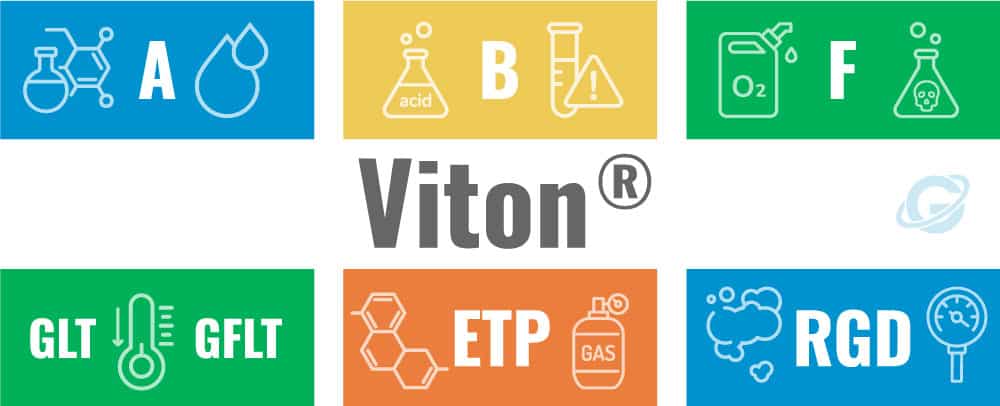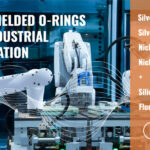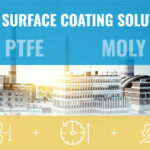
Summary
- Viton® (FKM) o-rings excel with heat and chemical resilience, offering robust performance for critical sealing applications across various sectors.
- Specialty grades like Viton® A, B, F, GLT, GFLT, ETP, and RGD cater to specific industry needs, offering tailored properties for resistance to chemicals and temperatures.
- Viton® o-rings are vital across industries, ensuring safe and efficient operations in aerospace, automotive, and oil sectors and meeting strict FDA standards in food and pharmaceuticals.
Introduction
Viton® (FKM) o-rings represent the pinnacle of sealing technology, where precision meets durability. Developed in the late 1950s by DuPont scientists, Viton® is a brand name for fluoropolymer elastomer known as FKM, which stands for Fluoroelastomer. A high fluorine content characterizes this synthetic rubber and is the source of its exceptional resistance to heat, chemicals, and other destructive forces. In the industrial world, Viton® o-rings are critical components that ensure countless operations’ safety, efficiency, and reliability. They have become indispensable in numerous applications, which is pivotal in advancing technology and industry.
Unique Properties of Viton® O-Rings
Viton® o-rings stand out in the seal industry due to their remarkable resilience and adaptability under adverse conditions. Because of their properties, Viton® o-rings fulfill the demanding requirements of industrial applications and frequently surpass expectations, delivering performance and security that engineers and maintenance professionals highly value.
Viton® o-ring’s temperature resistance range is one of its most notable attributes, with the capability to endure extremes from -15 °F (-26 °C) to 450 °F (232 °C) and, in specific formulations, even higher temperatures. This exceptional tolerance to heat allows them to maintain their structural integrity where other elastomers would succumb to degradation, ensuring reliability and extending the lifespan of the applications they serve.
The chemical resistance of Viton® o-rings is equally impressive. These seals exhibit outstanding durability when exposed to oils, fuels, lubricants, and a broad spectrum of mineral acids. This resistance secures their position as the seal of choice across diverse industries, including automotive, chemical processing, and petroleum sectors, where exposure to aggressive substances is commonplace.
Beyond their robustness in the face of harsh chemicals, Viton® o-rings are also renowned for their resistance to aging, weathering, and ozone. This resilience means they are less prone to cracking or becoming brittle over time, which is crucial for maintaining an effective seal and preventing leaks. The environmental resistance also means that Viton® o-rings are more sustainable and require less frequent replacement, providing cost savings over the long term.
Viton® o-rings demonstrate remarkable density and strength, providing the essential attributes that make them highly resistant to wear. This mechanical fortitude ensures their durability in applications that involve movement and mechanical stress, such as dynamic sealing applications where the seal’s ability to rebound and maintain shape is vital.
Lastly, the low permeability to gases is an essential feature of Viton® o-rings. This characteristic makes them particularly useful in vacuum applications or systems where a high degree of impermeability to gases is required, preventing leaks and ensuring the integrity of the sealed environment.
Viton® O-Rings in Extreme Conditions
Viton® o-rings are engineered for resilience, providing critical sealing capabilities in environments that challenge the limits of material properties. Their fluoropolymer makeup allows for a unique elasticity that maintains seal compression and recovery, even after prolonged exposure to extreme temperatures beyond the range of standard elastomers.
Regarding chemical resistance, Viton®’s molecular structure design forms a tight barrier against many substances. The carbon-fluorine bonds within the polymer are some of the strongest in organic chemistry, which translates into an exceptional resistance to breakdown or permeation by aggressive chemicals. This property is particularly advantageous in preventing seal degradation when exposed to hydrocarbons and other complex substances in the oil and gas industry.
In terms of handling pressure differentials, Viton® o-rings demonstrate remarkable endurance. The material’s intrinsic properties, such as high modulus and shear resistance, allow it to resist deformation under high pressure, while its flexibility enables it to seal effectively under vacuum. This dual capability is essential for applications such as deep-sea exploration, where external pressure is immense, and aerospace, where alternating vacuum and pressure cycles demand consistent performance.
The extended performance of Viton® o-rings is a direct result of their stability under stress. Their ability to resist permanent deformation (also known as ‘set’) under compression is crucial for maintaining a leak-proof seal over many use cycles. The resistance to set ensures that the o-ring will return to its original shape, providing a consistent seal and reducing the frequency of maintenance intervals.
Utilizing Viton® o-rings in your machinery means investing in a solution built to last. These o-rings meet the challenges of extreme conditions, ensuring that your equipment maintains its integrity and continues to operate at peak performance, even when faced with the harshest environments.
Special Grades of Viton® O-Rings

Viton® o-rings are a versatile arsenal of sealing options, each grade fine-tuned for specific industrial demands. The development of these specialized grades is a response to the varied and often extreme environments in which they operate. By offering custom formulations, manufacturers can address the unique challenges of different industrial applications, ensuring enhanced performance where generic o-rings fall short.
High-performance grades of Viton® o-rings are indispensable for industries operating at the cutting edge, where extremes of temperature, chemical exposure, and mechanical stress are commonplace. Viton® A is the foundational grade, renowned for its broad chemical resistance and suitability for various oils. Viton® B steps up, particularly for applications involving acids and caustic fluids, a stalwart in the chemical processing arena. Viton® F is the choice grade in scenarios demanding resistance to oxygenated fuels and aggressive acids.
The challenges of extreme temperatures, especially cold, are met by Viton® GLT and GFLT grades. GLT retains elasticity and sealing performance at temperatures as low as -40 °F (-40 °C), making it an essential component in cold climates or refrigerated processes. GFLT, on the other hand, while similar in its low-temperature capabilities, is optimized for a slightly higher operational temperature range. Viton® Extreme (ETP) provides the ultimate line of defense for the most punishing chemical environments, engineered to withstand sour gas and other destructive hydrocarbons. Its unparalleled chemical resilience makes ETP a prime selection for the oil exploration and production sectors, where exposure to highly aggressive substances is a daily reality.
In addition, the RGD-resistant version of Viton® counters the effects of rapid gas decompression (RGD), a critical concern in the oil and gas industry. These grades resist the physical damage that can occur when seals are exposed to high-pressure gas environments, ensuring integrity and continuity of operation.
Compliance with regulatory standards is not an afterthought but a guiding principle in selecting the appropriate Viton® grade. Industry-specific regulations dictate the suitability of each Viton® grade, from food processing, requiring FDA-compliant materials, to the aerospace and automotive sectors, which must adhere to stringent ASTM or SAE standards. The suitable grade ensures optimal performance and adherence to safety, reliability, and environmental mandates.
Navigating the complex landscape of Viton® grades can be daunting, but understanding the unique attributes of each can lead to informed decisions that enhance the performance and compliance of industrial sealing systems. With a tailored Viton® o-ring for nearly every application, these seals are more than just components; they are engineered solutions designed for excellence.
Industrial Applications of Viton® O-Rings

Viton® o-rings are instrumental in numerous industries due to their high-performance characteristics, with each sector benefiting from their unique properties in different ways.
In the aerospace and aviation industries, the reliability of components is paramount. Viton® o-rings are used extensively for their ability to maintain sealing force at extreme temperatures and pressure differentials experienced during flight and space exploration. They are integral in fuel systems, hydraulic lines, and engine gaskets where failure is not an option.
The automotive industry relies on Viton® o-rings for fuel handling systems. Their resistance to the corrosive nature of various fuels and additives and their ability to withstand high temperatures makes them ideal for use in fuel injectors, fuel pumps, and in the high-heat environment of combustion engines.
The conditions can be incredibly harsh in the oil and gas sector, with exposure to extreme pressures and corrosive substances. Viton® o-rings are chosen for their exceptional chemical resistance, ability to withstand sour gas and other hydrocarbons, and resilience to rapid gas decompression, making them essential for sealing in drilling and downhole equipment.
Food processing and pharmaceutical industries require materials that perform under varying temperatures and conditions and comply with stringent FDA regulations. Viton® o-rings meet these requirements, as they do not contaminate the product and allow for effective sanitation, ensuring safety and purity in processes that involve food, beverages, and medicines.
Each of these applications illustrates the versatility of Viton® o-rings and underscores their significance in the day-to-day operations of critical industries. Their widespread use is a testament to their reliability and the trust that professionals place in them to ensure safety, efficiency, and longevity of service.
Viton® O-Rings Selection Guide
Choosing the correct Viton® o-ring is crucial for ensuring optimal performance and longevity of your sealing solutions. This selection process involves a series of steps and considerations that can significantly impact the functionality and durability of the o-ring in its intended application.
- Chemical Compatibility: The media the o-ring gains exposure to is a primary factor for selection. Each media can affect the o-ring differently, whether oil, gas, water, acids, or bases. Viton®’s general chemical resistance is excellent, but certain media may require specific grades of Viton® for optimal performance.
- Temperature: Viton® o-rings are renowned for their ability to withstand extreme temperatures, but each grade has its own temperature range. Ensuring the o-ring you select can handle the operational temperatures it will encounter is essential to prevent failure.
- Pressure Conditions: The o-ring must withstand the system’s maximum pressure without extruding or deforming. This condition is where the type of service, dynamic or static, plays a pivotal role. Dynamic applications often require o-rings with higher tensile strength and elongation properties.
- Durometer: A harder o-ring (higher durometer) may be more resistant to extrusion and wear but less flexible, which can be a concern in low-temperature or dynamic applications. Conversely, a softer o-ring (lower durometer) may seal better at lower pressures but is more prone to wear and extrusion.
- Sizing: The cross-sectional diameter of the o-ring must be sufficient to fill the gland without being over-compressed, which can lead to premature failure. The inside and outside diameter of the o-ring must be compatible with the gland dimensions to ensure an effective seal and prevent leakage.
By carefully considering chemical compatibility, temperature, pressure, durometer, and size factors, you can select a Viton® o-ring perfectly tailored to your application’s needs, ensuring performance and reliability in the most demanding environments.
Future Outlook
As we look to the future, the role of Viton® o-rings becomes even more integral in industrial applications. The trends point toward smarter materials that can indicate wear, predict failure, and resist even more extreme conditions. Advances in material science promise the development of next-generation Viton® that could offer more excellent thermal stability, chemical inertness, and mechanical resilience. Sustainability considerations are also steering the evolution of Viton® towards more environmentally friendly production processes and recycling capabilities. As industries push the boundaries of innovation, Viton® o-rings will continue to be at the forefront, sealing the critical junctures between the present and the future of technological advancement.

 العربية
العربية  English
English  Español
Español  Français
Français  Português
Português  Deutsch
Deutsch  Italiano
Italiano  Русский
Русский  中文
中文  日本語
日本語  हिन्दी
हिन्दी 



